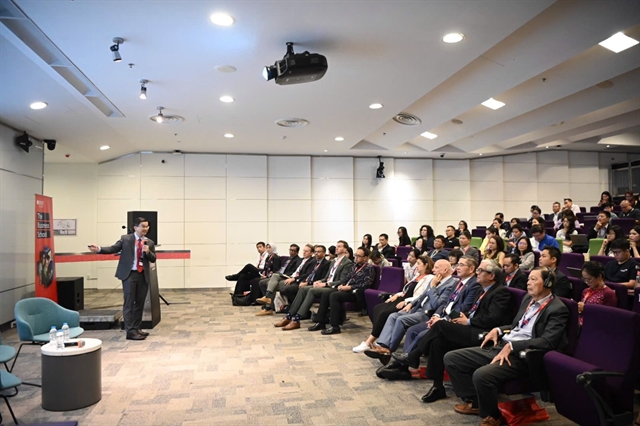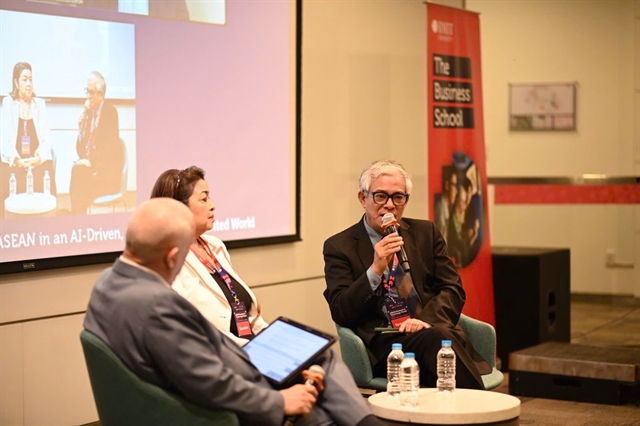 Economy
Economy


|
| Delegates attend the ASEAN Business and Technology Forum 2025 on October 24 in HCM City. Photo courtesy of the organiser |
HCM CITY — The ASEAN Business and Technology Forum 2025 (ABTF 2025), held in HCM City on October 24, has been hailed as a milestone event that begins shaping regional priorities for Việt Nam’s hosting of APEC 2027.
Gathering more than 300 representatives from government agencies, businesses, and academia across Southeast Asia, the forum placed Việt Nam at the centre of conversations about economic transformation, sustainable logistics, and digital innovation.
Speaking at the opening ceremony, Deputy Minister of Planning and Investment Nguyễn Thị Bích Ngọc said the ABTF 2025 marked the first concrete step for ASEAN economies to discuss shared visions toward APEC 2027.
She emphasised that Việt Nam was committed to fostering a “connected, green and digital” regional economy, underlining the country’s readiness to assume greater leadership in the Asia-Pacific cooperation framework.
Throughout the day, the forum addressed how ASEAN could align its strategies on trade, investment, and human capital development to strengthen its voice within APEC.
Participants noted that while ASEAN had achieved remarkable progress in economic integration, intra-regional trade still accounted for less than 25 per cent of its total exchanges.
Expanding cross-border commerce and deepening supply-chain links were therefore seen as essential to secure the bloc’s resilience amid global uncertainties.
Transport connectivity emerged as one of the most discussed themes.
Speakers from Singapore, Malaysia and Việt Nam shared plans to develop sustainable logistics corridors linking seaports, industrial zones and digital trade platforms.
Việt Nam’s southern provinces, with ongoing projects such as the HCM City–Cần Thơ expressway and Long Thành international airport, were highlighted as gateways for future ASEAN supply chains.
“If we want to build a truly resilient regional economy, we must invest not only in highways and seaports but also in digital highways that connect our data, our businesses and our people,” said Associate Professor Trần Minh Hà from the National University of Singapore.
In parallel, the forum dedicated special sessions to the digital economy and artificial intelligence.
Representatives from Amazon Web Services, Austrade and several ASEAN startups urged member economies to accelerate the deployment of data infrastructure and cloud technology.
According to the Việt Nam Digital Transformation Agency, the digital economy contributed nearly VNĐ 3.7 quadrillion (US$ 150 billion) to national GDP in 2024, accounting for around 18 per cent of total output.
Việt Nam aims to raise this share to 25 per cent by 2030, driven by AI-powered public services, fintech and smart manufacturing.
While the forum celebrated technological progress, experts also warned that digital expansion must go hand in hand with cybersecurity, data protection and workforce readiness.
Many ASEAN countries still face challenges in bridging digital divides between urban and rural areas. “Human capital mobility will define ASEAN’s future competitiveness,” said economist Đặng Quang Minh, noting that simplified visa regimes and mutual recognition of digital skills could help retain talent within the region.
Sustainability was another cornerstone of ABTF 2025 discussions. Participants underscored that green transition had become not just an environmental necessity but an economic opportunity.
Delegates from Việt Nam, Indonesia and Singapore showcased examples of renewable-energy financing, carbon-credit trading and electric-vehicle corridors.
The Việt Nam Green Finance Alliance reported that the country attracted more than VNĐ 190 trillion ($ 7.6 billion) in renewable-energy investment during 2023-2024, mainly in solar and offshore wind projects. However, experts called for clearer regulatory frameworks to mobilise private and international capital for sustainable growth.
The forum also featured the launch of a bilingual publication titled Phú Quốc 2027 – ASEAN Business Priorities Brief, produced by the Việt Nam Chamber of Commerce and Industry (VCCI) and international partners.
The report summarises strategic recommendations on trade, technology and green finance for policy-makers preparing for APEC 2027. According to VCCI Vice Chairman Trần Tuấn Anh, the document will serve as a “living reference” for future cooperation agendas.

|
| Speakers discuss ASEAN’s competitiveness in the AI and green transition era. Photo courtesy of the organiser |
“We must move from dialogue to implementation,” he said, urging governments to turn ABTF’s insights into concrete regional projects.
For Việt Nam, ABTF 2025 offered both visibility and responsibility. As host of APEC 2027, the country is expected to showcase its progress in innovation, energy transition and inclusive growth.
The Government has identified digital transformation, sustainable infrastructure and human-resource development as three pillars for national and regional cooperation.
These priorities resonate with Việt Nam’s recent economic performance: GDP growth reached 5.8 per cent in 2024, inflation remained under 4 per cent, and exports surpassed $370 billion, driven by electronics, textiles and agricultural products.
The city’s role in hosting ABTF 2025 also reaffirmed the city’s position as an emerging regional hub. Local authorities highlighted ongoing efforts to improve logistics efficiency, streamline business licensing and promote green industries.
Chairman of the municipal People’s Committee Phan Văn Mãi said the forum aligned perfectly with the city’s vision to become a centre for innovation and international cooperation in Southeast Asia.
Observers note that Việt Nam’s early initiative to convene a forum like ABTF 2025 demonstrates strategic foresight.
By engaging regional stakeholders two years before APEC 2027, the country is shaping narratives and priorities rather than merely responding to them.
The event thus marked the beginning of a multi-year dialogue connecting policy, business and technology communities under a shared regional agenda.
As the curtains closed, participants agreed that sustaining the forum’s momentum would be crucial.
They proposed annual follow-up meetings and digital platforms for continuous collaboration.
For Việt Nam, ABTF 2025 was not just an event but a declaration of intent: to lead by example in building a resilient, innovative and sustainable ASEAN that speaks with one voice at APEC 2027 and beyond. – VNS




